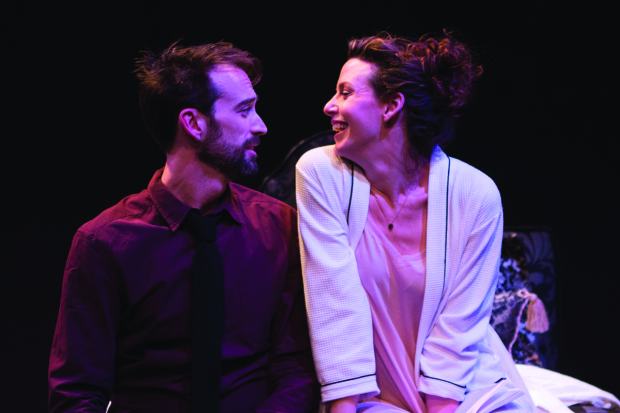The Hard Problem

(© Teresa Wood)
All Tom Stoppard's plays are intellectually stimulating invitations to the theatergoer to pay close attention from first moment to last. His most recent play, The Hard Problem, currently in a fine production at Studio Theatre, is a particularly cerebral puzzle that raises questions about human behavior, financial markets, scientific attitudes to the universe, and goodness.
The main character in The Hard Problem is a young psychology reseacher named Hilary, who finishes her studies in 2001 and applies for a job at the celebrated Krohl Institute for Brain Science. Over the next six years, Hilary and her colleagues take on a truly "hard problem": if the brain is only matter, what is consciousness, and is altruism merely the result of evolutionary biology?
Hilary's tutor is a mathematician named Spike. He quickly becomes her lover although he represents everything she dislikes. He is an egoist; she is an altruist. He is an atheist; she prays every night. She believes that mother-love is a deep, maternal feeling; he sees it as cultural conditioning. When Hilary applies for a job at the Krohl Institute, she meets a young man, Amal, who is applying for the same job. He gets a job as a hedge-fund manager at the Institute instead, and she gets the job he wanted. An old school friend of Hilary's, Julia, teaches pilates at the Institute. Julia's jealous partner, Ursula, also works there as a scientist. Hilary's boss, Leo, cares deeply for her. As she goes to work every day at the Institute, doing experiments that range from the inane to the bizarre, Hilary must relate to these people with whom she has nothing truly in common. The cast of characters is rounded out by Jerry, the wealthy, foulmouthed American who funds and runs the Institute; his adopted daughter, Cathy; and a young reseacher, Bo.
Tessa Klein is excellent as Hilary, a difficult role as she must continually respond to the scientists who surround her, people who cannot relate to her view of the world. Hilary had a child when she was 15 years old and was forced to give it up for adoption. She is a humanist first, a scientist second. Unlike most of the people at the Institute, she believes in a world in which emotions are as important if not more important, than ideas. Kyle Cameron is equally fine as the unlikable Spike. Although it's important to Stoppard's plot line that Spike be utterly different from Hilary, his coldness and crassness make it difficult to believe that she wants to have anything to do with him.
Shravan Amin as Amal nicely portrays the self-satisfied hedge-fund manager who believes that his good financial luck is somehow proof of his importance in the universe. The constellation of women who surround Hilary — Julia, played by Emily Kester; Ursula, by Joy Jones; and Bo, by Nancy Sun — all exist to make Hilary's good nature seem even better. Bo is utterly in love with her, as is her boss, the delightful Martin Giles. David Andrew MacDonald is horrifyingly credible as the crass American who has raised the money for the Institute and who now spends his time shouting into his phone. His daughter is nicely played by Katie Beth Hall. Nancy Robinette makes a brief, but convincing, cameo appearance on a video screen as a subject at the Institute.
Director Matt Torney keeps the action moving swiftly from scene to scene in this intermission-free drama. Debra Booth's set is spare, whatever its focus. The first scene in Hilary's bedroom contains just a bed. A later scene utilizes the full width and depth of the stage to show the ultramodern Institute lobby, its name emblazoned across the rear wall of the stage. Still later we see Hilary's sparsely decorated apartment. Each scene seems to illustrate the pared-down nature of Hilary's universe.
Critics often accuse The Hard Problem of lacking the metaphysical sparkle of Stoppard's previous plays, but using his incisive wit to solve gnarly problems was not Stoppard's goal here. Although all the characters are looking for a way out of their messy lives, it's only Hilary who gets a reprieve from the pain at the center of her existence.
In the end, Stoppard creates in Hilary a very recognizable woman: smart, independent, ready to feel and love, but not in a situation where she can feel and love. In many ways she is the ultimate alienated modern woman — surrounded by characters who misunderstand her and try to force her into roles she is not fit for. At the end of the play, Hilary changes herself completely, transforming her life in a way none of the other characters of The Hard Problem could. When she leaves the Institute to study something totally different, she clarifies her belief in virtue and morality, not mental gymnastics. That doesn't mean that The Hard Problem is a lesser Stoppard play. It is merely a different Stoppard play.











